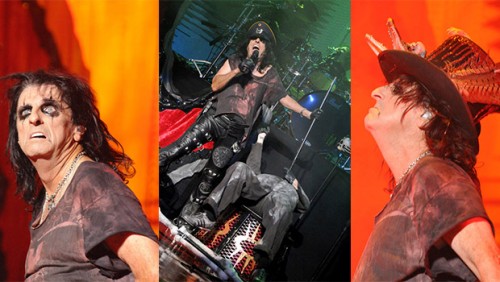Deborah Grabien and Lauren Murphy are so simpatico these days that they practically finish each other’s sentences during a joint interview. But if not for a chance meeting, the two Bay Area songwriters, singers and musicians might not have ever become such close compadres.
As Grabien tells it, the two had “traveled in the same musical circles” in the area but their paths did not cross until guitarist Mark Karan was doing a Valentine’s Day show focused on love songs and murder ballads at the Sweetwater in Marin County.
“Lauren walked in carrying a guitar and looked at me and said, ‘You’re Deb Grabien,’ and I said, ‘You’re Lauren Murphy,’ ” she says.
The duo spent the next day “eating pasta and sharing stories” at Grabien’s place in San Francisco, and after that, they wrote their first song together at Murphy’s then-home in El Dorado, planting the seeds for a friendship and partnership that has led them to do things like a dual CD-release show in March, for Murphy’s album “Psychedelics” and The Sound Field’s (which features Grabien) “This Moment of the Storm.”
As Grabien says, quite poetically, “There’s a lovely little line that goes between the yin and the yang, and we absolutely meet in the middle. We’re both storytellers, and I want to separate that from being a songwriter — it’s not the same thing. Songwriting is a skill. You can teach people to write songs. You can teach them to write lyrics. What you cannot fake or teach, if it is not already there, is the seed in a storyteller that grows the story.”
The two also play together in a group called Nasty Women and Bad Hombres.
Stories, of course, come from life experience, and Grabien and Murphy both have had more than their fair share. Grabien is a long-time author who has MS. Murphy’s husband, Judge Murphy, died in 2013 after a battle with liver cancer. He was the singer for Bay Area band Zero — known for Steve Kimock’s guitar work and collaborations with Grateful Dead lyricist Robert Hunter.
From afar, the Bay Area music scene might seem like a walled-off Shangri La dominated by the Dead, Jefferson Airplane and other stars, but it seems a lot looser and welcoming than that from speaking with Grabien and Murply.
“I’m talking to you from Mobile, Alabama, even though I have a 415 area code,” Murphy says. “I always consider myself to be from San Francisco. My ringtone is Tony Bennett coming through the phone, singing ‘I left my heart in San Francisco.'”
Karan, a Bay Area stalwart himself (and the coproudcer of “Psychedelics”), made himself available to the Murphys during their darkest days.
“Judge and I met Mark in 2010 when Judge started his battle with cancer,” she says. Karan, known for his work in Bob Weir’s Ratdog and the ‘90s and early 2000s Dead offshoot The Other Ones, told the vocalist he knew what it was like to be dealing with cancer in public: someone in his band at the time had leaked that Karan had throat cancer.
“It’s hard to go through disease and treatment and death in public,” Murphy says. “People are supportive when you let your monsters out of the closet into the front yard. And Mark is one of the people who came out.”
Karen plays on both women’s new albums and c0-produced Murphy’s with her.
Grabien doesn’t mention her MS until we ask her about playing a saz on “The Moment of the Storm.” Specifically, what is a saz? That, of course, leads to a story.
“Back around 2012, I was sitting talking to Jorma [Kaukonen] at Sweetwater, who I had known for about 50 years,” she recalls. “I was diagnosed with MS in 2002, and the slide mojo just left town. Even now, fretting a guitar is no longer reflexes. The brain looks at the fingers and goes, ‘Do this.’ It’s amazing I can play anything at all at this point. Jorma said to come out and register at Fur Peace, and I said, ‘But I’m not a slide player.’ And he said, ‘I know David Lindley!’ And I said, ‘David Lindley? Why, is Ry Cooder not available?’ He said, ‘No, David actually teaches courses at Fur Peace Ranch and he teaches on the West Coast, do you want me to hook you up?'”
Grabien had tickets to see Lindley two weeks later in San Rafael. She met him there and they became fast friends. Later, she saw a video of Lindley playing a strange stringed instrument on his rendition of Steve Earle’s “Copperhead Road.” She emailed Lindley, found out that it a Turkish instrument called a saz, and she ordered one for $169. Grabien’s saz playing and Lindley on Irish bouzouki and lap steel add to the deep textures on “This Moment of the Storm.”
Interesting enough, Grabien’s relationship with Kaukonen is not the only Jefferson Airplane connection the two women have. On “Psychedelics,” Murphy includes a few covers: Zero’s “End of the World Blues” and “Catalina” as well as the Airplane classic “Somebody to Love.”
Recounts Murphy: “I was playing the song at 10 a.m., having coffee in Sonoma. Darby Slick walks in and says, ‘I’m Darby. I wrote that.’ And I said, ‘I know.’ He said, ‘You mind if I get a guitar? Can you play that again and do you mind if I play with you?’ ‘Please.'”
“He’s still a good friend of mine,” she says. “And we wanted to work up a more aggro version than the Airplane, especially in today’s times [for her album].”
Murphy recorded the album at Dauphin Street Sound in Mobile, the studio owned by former baseball pitcher Jake Peavy, a guitarist and Deadhead in his own right.
There are more stories. Like Grabien’s older sister coining the term Deadhead, maybe dating Hunter and ending up in the Dead’s “Truckin.'” Really. Grabien said she walked into a heavy argument between her sister and Hunter at her sister’s house. “I’m putting you in my song,” Hunter exclaimed while writing furiously, then threw down his pencil.
What in the world ever became of sweet Jane?
She lost her sparkle, you know she isn’t the same
Livin’ on reds, vitamin C, and cocaine
“But I don’t do cocaine!” her sister protested.
“You do now,” Hunter said.
Some stories are just too good not to share, whether or not they become songs. And for Murphy and Grabien, it’s the story that always sits at the head of the table.
“We don’t ever start from a place of polished or fake,” says Grabien. “In the end, if you’re a storyteller, your story doesn’t owe you a damn thing. You owe your story. You are in service to your story, and not the other way around.”
From left to right, Deborah Grabien (Courtesy of The Sound Field) and Lauren Murphy (Credit: Tom Dellinger)




Leave a Reply